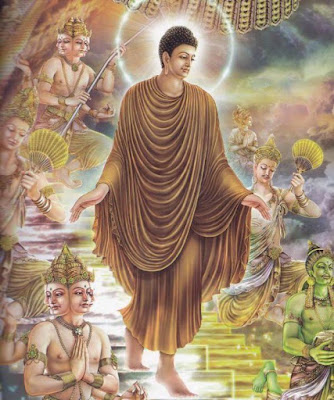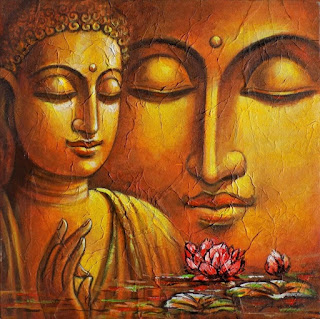"Here, indeed, are found the First Samana, the Second Samana, the Third Samana, and the Fourth Samana. The other foreign schools are empty of Samanas. If, O Subhadda, the disciples live rightly, the world would not be void of Arahants.
"My age was twenty-nine when I went forth as a seeker after what is good. Now one and fifty years are gone since I was ordained. Outside this fold there is not a single ascetic who acts even partly in accordance with this realizable doctrine."
Thereupon Subhadda spoke to the Buddha as follows:
"Excellent, Lord, excellent! It is as if, O Lord, a man were to set upright that which was overturned, or were to reveal that which was hidden, or were to point the way to one who has gone astray, or were to hold a lamp amidst the darkness, so that whoever has eyes may see, even so has the doctrine been expounded in various ways by the Exalted One.
"And I, Lord, seek refuge in the Buddha, the Doctrine, and the Order. May I receive the Lesser and the Higher Ordination in the presence of the Exalted One!"
"Whoever, Subhadda," said the Buddha, "being already committed to the other doctrines desires the Lesser and the Higher 0rdination, remains on probation for four months. At the end of four months, the disciples approving, he is ordained and raised to the status of a Bhikkhu. Nevertheless, on understanding, I make individual exception."
Then said Subhadda:
"If, Lord, those already committed to other doctrines, who desire the Lesser and the Higher Ordination in this Dispensation, remain on probation for four months, I too will remain on probation; and after the lapse of that period, the disciples approving, let me be received into the Order and raised to the status of a Bhikkhu."
Thereupon the Buddha addressed Ānanda and said:
Then, Ānanda, you may ordain Subhadda."
"So, be it, Lord!" replied Ānanda.
And Subhadda, the wandering ascetic, spoke to the Venerable Ānanda as follows:
"It is a gain to you, O Venerable Ānanda! It is indeed a great gain to you, for you have been anointed by the anointment of discipleship in the presence of the Exalted One by Himself."
Subhadda received in the presence of the Buddha the Lesser and the Higher Ordination.
And in no long time after his Higher Ordination, the Venerable Subhadda, living alone, remote from men, strenuous, energetic, and resolute, realized, in this life itself, by his own intuitive knowledge, the consummation of that incomparable Life of Holiness, and lived abiding in that state for the sake of which sons of noble families rightly leave the householder's life for the homeless life. He perceived that rebirth was ended, completed was the Holy Life, that after this life there was none other.
And the Venerable Subhadda became one of the Arahants. He was the last personal convert of the Buddha
The Last Words to Ānanda
The Venerable Ānanda desired to know what they should do with the body of the Tathāgata.
The Buddha answered. Do not engage yourselves in honouring the remains of the Tathāgata. Be concerned about your own welfare (i.e. Arahantship). Devote yourselves to your own welfare. Be heedful, be strenuous, and be intent on your own good. There are wise warriors, wise brahmins, wise householders who are firm believers in the Tathāgata. They will do honour to the remains of the Tathāgata.
At the conclusion of these interesting religious talks Venerable Ānanda went aside and stood weeping at the thought: "Alas! I am still a learner with work yet to do. But my Master will finally pass away -- He who is my sympathiser".
The Buddha, noticing his absence, summoned him to His presence and exhorted him thus -- "Enough, O Ānanda! Do not grieve, do not weep. Have I not already told you that we have to separate and divide and sever ourselves from everything that is dear and pleasant to us?
"O Ānanda, you have done much merit. Soon be freed from Defilements."
The Buddha then paid a tribute to Venerable Ānanda, commenting on his salient virtues.
After admonishing Venerable Ānanda in various ways, the Buddha ordered him to enter Kusinārā and inform the Mallas of the impending death of the Tathāgata. Mallas were duly informed, and came weeping with their wives, young men, and maidens, to pay their last respects to the Tathāgata.
The Last Scene
Then the Blessed One addressed Ānanda and said:
"It may be, Ānanda, that you will say thus: 'Without the Teacher is the Sublime Teaching! There is no Teacher for us.' Nay, Ānanda, you should not think thus. Whatever Doctrine and Discipline have been taught and promulgated by me, Ānanda, they will be your Teacher when I am gone."
"Let the Sangha, O Ānanda, if willing, abrogate the lesser and minor rules after my death, " remarked the Buddha.
Instead of using the imperative form the Buddha has used the subjunctive in this connection. Had it been His wish that the lesser rules should be abolished, He could have used the imperative. The Buddha foresaw that Venerable Kassapa, presiding over the First Council, would, with the consent of the Sangha, not abrogate any rule hence His use of the subjunctive, states the commentator.
As the Buddha has not clearly stated what these minor rules were and as the Arahants could not come to any decision about them, they preferred not to alter any rule but to retain all intact.
Again the Buddha addressed the disciples and said: "If, O disciples, there be any doubt as to the Buddha, or the Doctrine, or the Order, or the Path, or the Method, question me, and repent not afterwards thinking, -- we were face to face with the Teacher, yet we were not able to question the Exalted One in His presence." When He spoke thus the disciples were silent.
For the second and third time the Buddha addressed the disciples in the same way. And for the second and third time the disciples were silent.
Then the Buddha addressed the disciples and said: "Perhaps it may be out of respect for the Teacher that you do not question me. Let a friend, O disciples, intimate it to another."
Still the disciples were silent.
Thereupon the Venerable Ānanda spoke to the Buddha as follows:
"Wonderful, Lord! Marvellous, Lord! Thus am I pleased with the company of disciples. There is not a single disciple who entertains a doubt or perplexity with regard to the Buddha, the Doctrine, the Order, the Path and the Method."
"You speak out of faith, Ānanda, with regard to this matter. There is knowledge in the Tathāgata, that in this company of disciples there is not a single disciple who entertains a doubt or perplexity with regard to the Doctrine, the Order, the Path and the Method. Of these five hundred disciples, Ānanda, he who is the last is a Stream Winner, not subject to fall but certain and destined for Enlightenment.
Lastly the Buddha addressed the disciples and gave His final exhortation.
"Behold, O disciples, I exhort you. Subject to change are all component things. Strive on with diligence (Vayadhammā samkhārā, Appāmadena sampādetha).
These were the last words of the Blessed One.
The Passing Away
The Buddha attained to the first Ecstasy (Jhāna). Emerging from it, He attained in order to the second, third, and fourth Ecstasies. Emerging from the fourth Ecstasy, He attained to "The Realm of the Infinity of Space" (Akāsānañcāyatana). Emerging from it He attained to "The Realm of the Infinity of Consciousness" (Viññānañ¼āyatana). Emerging from it, He attained to "The Realm of Nothingness" (Ākiñcaññāyatana). Emerging from it, He attained to "The Realm of Neither Perception nor Non-perception" (N'eva saññā nāsañāyatana). Emerging from it, He attained to "The cessation of Perceptions and Sensations". (Saññāvedayita-Nirodha).
Venerable Ānanda, who had then not developed the Divine Eye, addressed Venerable Anuruddha and said: "O Venerable Anuruddha, the Exalted One has passed away."
"Nay, brother Ānanda, the Exalted One has not passed away but has attained to "The Cessation of Perceptions and Sensations".
Then the Buddha, emerging from "The Cessation of Perceptions and Sensations", attained to "The Realm of Neither Perception nor Non-perception." Emerging from it, He attained to "The Realm of Nothingness." Emerging from it, He attained to "The Realm of the Infinity of Consciousness." Emerging from it, He attained to "The Realm of the Infinity of Space." Emerging from it. He attained to the fourth Ecstasy. Emerging from it, He attained to the third Ecstasy. Emerging from it, He attained to the second Ecstasy. Emerging from it, He attained to the first Ecstasy. Emerging from it, He attained to the second Ecstasy. Emerging from it, He attained to the third Ecstasy. Emerging from it, He attained to the fourth Ecstasy. Emerging from it, and immediately after, the Buddha finally passed away
Ven Dr .Nārada Mahāthera








Comments
Post a Comment